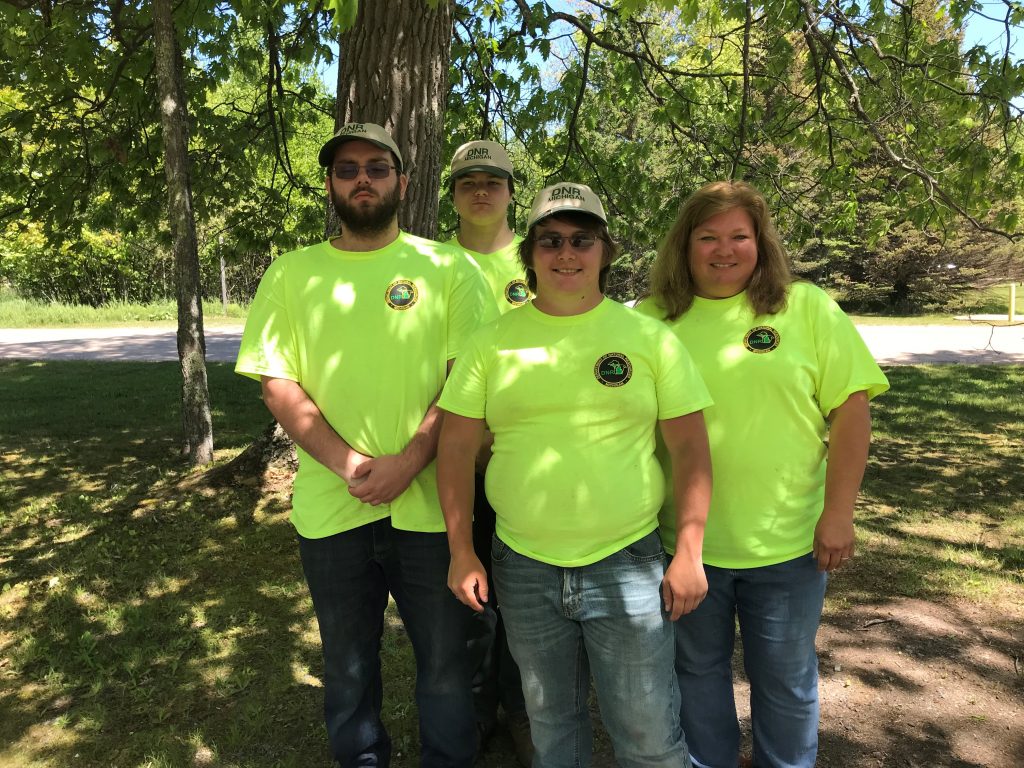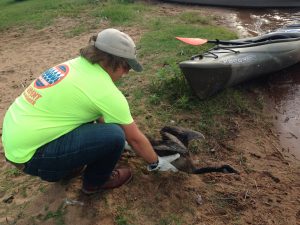
A group of local students with disabilities are getting a little extra encouragement and training from a state program.
 Ten students from Baraga and Houghton Counties worked at the Baraga State Park, Twin Lakes State Park, and McLain State Park this summer.
Ten students from Baraga and Houghton Counties worked at the Baraga State Park, Twin Lakes State Park, and McLain State Park this summer.
The experience was made possible through a partnership between the Michigan Department of Natural Resources – Parks and Recreation Division, Michigan Rehabilitation Services and Copper Country Intermediate School District.
 These paid summer experiences help build confidence through valuable real-world training for students.
These paid summer experiences help build confidence through valuable real-world training for students.
Students focus on developing essential employability skills, like problem solving or teamwork, and perform basic maintenance duties around the park or recreation area.
Several of the students have been offered continued employment at the parks after completion of the work-based learning experience.
Here is the full press release:
Initiative Breaks Down Employment Barriers for Youth with Disabilities
Students prove that challenges do not interfere with becoming highly effective workers
Hancock, MI — People often identify themselves by the work that they do. A job can provide a sense of accomplishment and pride and have an enormous effect on our overall life satisfaction. Finding the right job – simply knowing what that might be – is not easy, even for highly skilled individuals. Doing so is even more difficult for those who lack training or face special challenges, such as a disability. Preparing students for the workforce is an important role for schools and one promising practice is taking place in our community.
This summer, the Michigan Department of Natural Resources – Parks and Recreation Division, Michigan Rehabilitation Services and Copper Country Intermediate School District partnered to make possible paid, work-based learning experiences for students with disabilities. This initiative includes work sites at 44 state parks or recreation areas across Michigan including 3 state parks in this area. These paid summer experiences help build confidence through valuable real-world training for students. Students focus on developing essential employability skills, like problem solving or teamwork, and perform basic maintenance duties around the park or recreation area.
In Baraga and Houghton Counties 10 students worked at the Baraga State Park, Twin Lakes State Park, and McLain State Park sites. Austin Pesonen, Zack Goodreau, and Cole Gleason worked at the Baraga State Park along with Job Coach Janet Sterbenz. Jonah Anttila, Alex Schwab, and Mason Bukovich worked at the Twin Lakes State Park along with Job Coach Steve Aho. Nina Helppi, Joshua Filpus, Zakk Tussing, and Shawna Kump worked at the McLain State Park along with Job Coach Cathy Rowe. Several of the students have been offered continued employment at the parks after completion of the work-based learning experience.
During the school year, regional high schools work to engage and support these students by helping identify their strengths and interests and provide them with the skills they need to succeed in the workplace. The core elements of workforce preparation for students with disabilities are the same as those for their nondisabled peers—awareness of interests and aptitudes, exposure to career options, and assessing and building skills—but they may require more extensive and individualized support from school personnel, skills trainers and other adults.
In Michigan young people are faced with the growing challenge of contending for entry level positions against more seasoned competition. These positions typically serve as stepping stones for students or recent graduates to establish a work history, gain experience, and develop basic employability skills required for success in adulthood. The dynamics of this challenge are compounded for youth with disabilities.
These work experiences help students establish core employability skills necessary to secure competitive employment. The relationships developed through this community effort are providing the foundation and momentum to achieving a  broader vision that includes: maximizing resources, supporting local businesses, and growing a young workforce into an effective and diverse community of workers.
broader vision that includes: maximizing resources, supporting local businesses, and growing a young workforce into an effective and diverse community of workers.
Michigan Rehabilitation Services (MRS) develops customized workforce solutions for businesses and individuals with disabilities. For more information about MRS in the Upper Peninsula, contact (800) 562-7860 or visit the state website www.michigan.gov/mrs.
 Keweenaw Report Your Source for Local News and Sports
Keweenaw Report Your Source for Local News and Sports





